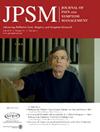严重疾病中具有挑战性症状的药物治疗考虑:金凤花指南
IF 3.2
2区 医学
Q2 CLINICAL NEUROLOGY
引用次数: 0
摘要
Outcomes1。在本次演讲结束时,参与者将能够:1。描述终末期肾病和终末期肝病患者症状管理的最佳实践。描述处理诸如恶性肠梗阻和晚期分泌物等症状的最佳做法。3. 描述控制症状的药物治疗策略。4. 描述丁丙诺啡给药的最佳做法。患有严重疾病的患者经常依靠药物来缓解他们的症状(疼痛和非疼痛)。在病人生命的这个阶段,药物治疗是一种平衡的行为——临床医生需要了解何时、什么、如何去开处方,以及如何严格选择新的药物加入到混合药物中。本次会前会议将涵盖各种主题,以说明精确药物治疗-被称为“金凤花指南”。主题将包括管理具有挑战性的非疼痛症状,如恶性肠梗阻,恶心/呕吐,晚期分泌物,疲劳等。我们还将讨论终末期肾病和终末期肝病的症状管理。我们将讨论肾脏支持护理的基本技术,重点关注几个关键领域。我们将探讨治疗肾脏疾病的疲劳、便秘、瘙痒/瘙痒,以及肝脏疾病的恶心、意识不清和腹水的各种方法。我们将强调阿片类药物、加巴喷丁、甚至非甾体抗炎药(用于肾脏疾病)等药物的正确选择和剂量的重要性!作为一个特殊的治疗,我们将讨论一个实际的现实世界的方法来管理躁动在临终关怀和姑息治疗病人。这个内容将集中在深思熟虑的使用药理学,以减轻高度痛苦的症状谵妄我们的病人经常经历。似乎这还不够,这次演讲将涵盖丁丙诺啡对接受姑息治疗或临终关怀的患者的使用。这将包括候选人选择和剂量考虑。作为一项特别活动,每位演讲者将回顾最近两项关于在严重疾病中适当使用药物治疗的有影响力的研究。本文章由计算机程序翻译,如有差异,请以英文原文为准。
Pharmacotherapy Considerations for Challenging Symptoms in Serious Illness: The Goldilocks Guide
Outcomes
1. At the conclusion of this presentation the participant will be able to: 1. Describe best practices for symptom management in patients with end-stage renal disease and end-stage liver disease.
2. Describe best practices for managing symptoms such as malignant bowel obstruction, and terminal secretions. 3. Describe pharmacotherapy strategies to control symptoms. 4. Describe best practices in dosing buprenorphine.
Patients living with a serious illness frequently rely on medications to palliate their symptoms (pain and non-pain). Drug therapy at this stage of a patient's life is a balancing act – clinicians need to be knowledgeable about when, what, and how to deprescribe, and how to critically select new medications to add to the mix. This pre-conference will cover a variety of topics that will illustrate precision pharmacotherapy – referred to as “The Goldilocks Guide.”
Topics will include management of challenging non-pain symptoms such as malignant bowel obstruction, nausea/vomiting, terminal secretions, fatigue and more. We will also address symptom management in end-stage renal disease and end-stage liver disease. We will discuss essential techniques of kidney supportive care focusing on several key areas. We will explore various approaches to treating fatigue, constipation, itching/pruritus in renal disease, and nausea, confusion, and ascites in liver disease. We will emphasize the importance of proper selection and dosing for medications such as opioids, gabapentin, and, dare we say, maybe even NSAIDs (in renal disease)! As a special treat, we will discuss a practical real-world approach to managing agitation in the hospice and palliative care patient. This content will focus on the thoughtful use of pharmacology to relieve the highly distressing symptoms of delirium our patients often experience. As if that weren't enough, this presentation will cover the use of buprenorphine for patients receiving palliative or hospice care. This will include candidate selection, and dosing considerations. And as a special treat, each speaker will review two recent and impactful studies on the appropriate use of pharmacotherapy in serious illness.
求助全文
通过发布文献求助,成功后即可免费获取论文全文。
去求助
来源期刊
CiteScore
8.90
自引率
6.40%
发文量
821
审稿时长
26 days
期刊介绍:
The Journal of Pain and Symptom Management is an internationally respected, peer-reviewed journal and serves an interdisciplinary audience of professionals by providing a forum for the publication of the latest clinical research and best practices related to the relief of illness burden among patients afflicted with serious or life-threatening illness.

 求助内容:
求助内容: 应助结果提醒方式:
应助结果提醒方式:


